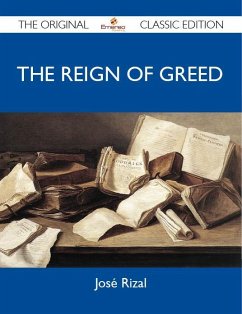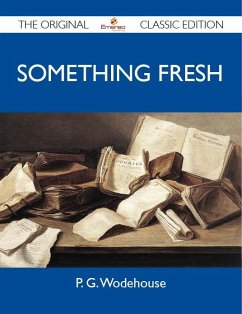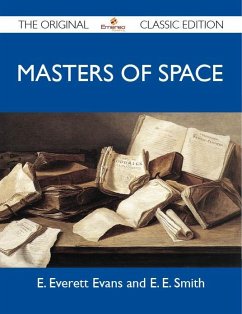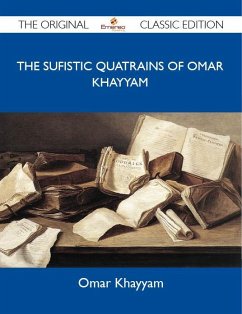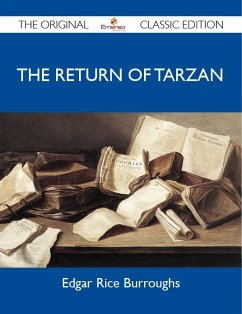
The Social Cancer - The Original Classic Edition (eBook, ePUB)

PAYBACK Punkte
2 °P sammeln!
This is a high quality book of the original classic edition. This is a freshly published edition of this culturally important work, which is now, at last, again available to you. Enjoy this classic work. These few paragraphs distill the contents and give you a quick look inside: The tactics employed in the conquest and the subsequent behavior of the conquerors were true to the old Spanish nature, so succinctly characterized by a plain-spoken Englishman of Mary?s reign, when the war-cry of Castile encircled the globe and even hovered ominously near the ?sceptered isle,? when in the intoxication...
This is a high quality book of the original classic edition.
This is a freshly published edition of this culturally important work, which is now, at last, again available to you.
Enjoy this classic work. These few paragraphs distill the contents and give you a quick look inside:
The tactics employed in the conquest and the subsequent behavior of the conquerors were true to the old Spanish nature, so succinctly characterized by a plain-spoken Englishman of Mary?s reign, when the war-cry of Castile encircled the globe and even hovered ominously near the ?sceptered isle,? when in the intoxication of power character stands out so sharply defined: ?They be verye wyse and politicke, and can, thorowe ther wysdome, reform and brydell theyr owne natures for a tyme, and applye ther conditions to the manners of those men with whom they meddell gladlye by friendshippe; whose mischievous maners a man shall never know untyll he come under ther subjection; but then shall he parfectlye parceve and fele them: for in dissimulations untyll they have ther purposes, and afterwards in oppression and tyrannye, when they can obtain them, they do exceed all other nations upon the earthe.?
Only with the passing of the years and the increase of wealth and influence, the ease and luxury invited by these, and the consequent corruption so induced, with the insatiable longing ever for more wealth and greater influence, did the poison of greed and grasping power enter the system to work its insidious way into every part, slowly transforming the beneficent institution of the sixteenth and seventeenth centuries into an incubus weighing upon all the activities of the people in the nineteenth, an unyielding bar to the development of the country, a hideous anachronism in these modern times.
Of this halcyon period, just before the process of disintegration began, there has fortunately been left a record which may be characterized as the most notable Spanish literary production relating to the Philippines, being the calm, sympathetic, judicial account of one who had spent his manhood in the work there and who, full of years and experience, sat down to tell the story of their life.4 In it there are no puerile whinings, no querulous curses that tropical Malays do not order their lives as did the people of the Spanish village where he may have been reared, no selfish laments of ingratitude over blessings unasked and only imperfectly understood by the natives, no fatuous self-deception as to the real conditions, but a patient consideration of the difficulties encountered, the [xiii]good accomplished, and the unavoidable evils incident to any human work.
The author, however, himself a ?miserable Indian,? vividly depicts the unnatural conditions and dominant characters produced under the outworn system of fraud and force, at the same time presenting his people as living, feeling, struggling individuals, with all the frailties of human nature and all the possibilities of mankind, either for good or evil; incidentally he throws into marked contrast the despicable depreciation used by the Spanish writers in referring to the Filipinos, making clear the application of the self-evident proposition that no ordinary human being in the presence of superior force can very well conduct himself as a man unless he be treated as such.
This is a freshly published edition of this culturally important work, which is now, at last, again available to you.
Enjoy this classic work. These few paragraphs distill the contents and give you a quick look inside:
The tactics employed in the conquest and the subsequent behavior of the conquerors were true to the old Spanish nature, so succinctly characterized by a plain-spoken Englishman of Mary?s reign, when the war-cry of Castile encircled the globe and even hovered ominously near the ?sceptered isle,? when in the intoxication of power character stands out so sharply defined: ?They be verye wyse and politicke, and can, thorowe ther wysdome, reform and brydell theyr owne natures for a tyme, and applye ther conditions to the manners of those men with whom they meddell gladlye by friendshippe; whose mischievous maners a man shall never know untyll he come under ther subjection; but then shall he parfectlye parceve and fele them: for in dissimulations untyll they have ther purposes, and afterwards in oppression and tyrannye, when they can obtain them, they do exceed all other nations upon the earthe.?
Only with the passing of the years and the increase of wealth and influence, the ease and luxury invited by these, and the consequent corruption so induced, with the insatiable longing ever for more wealth and greater influence, did the poison of greed and grasping power enter the system to work its insidious way into every part, slowly transforming the beneficent institution of the sixteenth and seventeenth centuries into an incubus weighing upon all the activities of the people in the nineteenth, an unyielding bar to the development of the country, a hideous anachronism in these modern times.
Of this halcyon period, just before the process of disintegration began, there has fortunately been left a record which may be characterized as the most notable Spanish literary production relating to the Philippines, being the calm, sympathetic, judicial account of one who had spent his manhood in the work there and who, full of years and experience, sat down to tell the story of their life.4 In it there are no puerile whinings, no querulous curses that tropical Malays do not order their lives as did the people of the Spanish village where he may have been reared, no selfish laments of ingratitude over blessings unasked and only imperfectly understood by the natives, no fatuous self-deception as to the real conditions, but a patient consideration of the difficulties encountered, the [xiii]good accomplished, and the unavoidable evils incident to any human work.
The author, however, himself a ?miserable Indian,? vividly depicts the unnatural conditions and dominant characters produced under the outworn system of fraud and force, at the same time presenting his people as living, feeling, struggling individuals, with all the frailties of human nature and all the possibilities of mankind, either for good or evil; incidentally he throws into marked contrast the despicable depreciation used by the Spanish writers in referring to the Filipinos, making clear the application of the self-evident proposition that no ordinary human being in the presence of superior force can very well conduct himself as a man unless he be treated as such.
Dieser Download kann aus rechtlichen Gründen nur mit Rechnungsadresse in A, D ausgeliefert werden.





